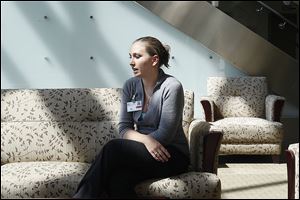
Actress Angelina Jolie's mastectomy leads to local calls asking advice
Genetic test yields both knowledge, challenges
5/15/2013
Kelly Morse, a counselor specializing in cancer genetics, talks about genetic testing in the lobby of the Hickman Cancer Center at Flower Hospital. ‘It’s more than a simple blood test,’ she says of looking for mutations that raise the risk of cancer.
After actress Angelina Jolie disclosed that she had a preventive double mastectomy upon learning she carries a hereditary gene that raises the risk for breast cancer, ProMedica’s Kelly Morse was busy with requests to learn more about the tests to detect the potential gene mutations.
Ms. Morse, a certified genetic counselor for ProMedica’s Hickman Cancer Center at Flower Hospital, said a test called BRACAnalysis can find changes that would cause the BRCA gene not to work correctly.
BRACAnalysis test results tell patients about their risk for cancer, by identifying a BRCA gene mutation, but they are not intended to detect whether patients currently have or will actually develop cancer.
Everyone has the BRCA genes, but abnormal or mutated genes are associated with hereditary breast and ovarian cancer syndrome.
Ms. Morse said a typical genetic counseling session starts with collecting family history.
At many institutions, the BRCA gene test is typically only performed on patients thought to have a high risk of breast and ovarian cancers. Such risks include a personal history of such cancers, a male relative with breast cancer, at least two close relatives who were diagnosed with breast cancer at a young age, or a relative with a known mutation.
For women and men who want to test for the BRCA1 and BRCA2 mutations, Ms. Morse recommends submitting blood for the BRACAnalysis.
Blood work from ProMedica facilities is shipped overnight to Myriad Genetic Laboratories Inc. in Salt Lake City. Results are usually returned in about two weeks.
“...A woman who has inherited a harmful mutation in BRCA1 or BRCA2 is about five times more likely to develop breast cancer than a woman who does not have such a mutation,” according to the National Cancer Institute at the National Institutes of Health.
The institute estimates that inherited mutations of both BRCA1 and BRCA2 “account for 5 to 10 percent of breast cancers.”
Not all gene mutations are harmful, however.
Test results received at ProMedica are usually presented in person, which gives Ms. Morse the opportunity to discuss options with patients.
In the case of a BRCA1 gene mutation, it is recommended that women who test positive get mammograms and breast MRI’s alternating, every six months, starting in their mid 20s.
But if a patient has a positive result and is seeking immediate treatment, Ms. Morse said there is another option.
“Women can also choose surgery, which is what Angelina Jolie had,” she said.
Testing for the BRCA1 and BRCA2 gene mutation is not cheap, although Ms. Morse said some insurance plans cover more than others.
“Insurance typically covers it, per the policy, if the patient meets the criteria,” she said.
She said out-of-pocket, the cost for the BRACAnalysis is about $4,040.
While the results can be stressful for patients who test positive, Ms. Morse said support groups can help.
Bright Pink, a national nonprofit that focuses on the early detection of breast cancer in young women, is one such organization.
Its services include PinkPal, a peer support for young women at high risk of breast or ovarian cancer.
It also gives women information about employment, financial, and legal issues involved in carrying a high risk of such cancers.
Ms. Morse said working with a genetic counselor can help patients determine their risks and options.
“It’s more than just a simple blood test,” she said.
“There are lots of layers to what that might mean for you personally.”
Contact Kelly McLendon at: kmclendon@theblade.com, 419-724-6522 or on Twitter @KMcBlade.